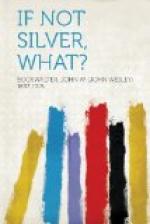In his work “The Bimetallic Question” Hon. Samuel Smith, M. P., presents as an evidence of the hardships due to the increasing purchasing power of money these facts: “The English landlords who borrowed L400,000,000 on their property, agreeing to pay, let us say, L16,000,000 a year, interest at 4 per cent., supposing that it represented one-quarter of their rents, now find, owing to the fall of prices, that it represents one-third, or even in some cases one-half of their rent.... The factory owner, the mine owner, the ship owner, who thought it safe twenty years ago to borrow half the value of his plant in order to find capital for his business, now finds that the mortgagee is the virtual owner. Nearly all the profits go to pay the mortgagee’s claim, and in many cases he has foreclosed, and sold out the unhappy borrower, ruined through no fault of his own, but through the extraordinary sinking of prices. As a matter of fact, I believe that if all the fixed capital engaged in trade in England could be valued to-day at its real selling price, it would be found that it would do little more than pay the mortgages and debts upon it. Trade is very greatly and injuriously affected by sudden alterations in the standard of value, especially when the alteration is, as now, towards increased values. It arises in this way: trade is largely carried on by borrowed capital, or, in other words, by the use of credit in some shape or other; the vast banking deposits are mainly loaned to traders; a very great deal of the invested capital of this country is lent upon mortgages upon trading property such as ships, factories, and warehouses. A prudent trader usually considers it safe to draw considerably beyond his floating capital, and to borrow say 50 per cent. upon his plant or a fixed capital. Now, the constant decline in prices within the last few years has virtually swept away his own portion of the capital, and only left him enough to pay the loans and mortgages. For instance, a ship or a factory built at a cost of twenty thousand pounds, of which ten thousand were borrowed, is now worth only twelve thousand pounds, or 40 per cent. less; and so the mortgage represents five-sixths of the value instead of one-half, the trader’s interest having sunk to two thousand pounds in place of ten thousand. Probably, if trade is unprofitable, he fails to pay the interest and the mortgage is foreclosed; the property is forced off at just sufficient to cover the loan and he is ruined. I have no doubt that this exactly describes the condition that confronts numbers of traders in this country and other countries having the gold standard. A great portion of the commercial capital of the country has passed into the hands of the mortgagees and bondholders who have neither toiled or spun. The discouragement this state of things produces is intense. After it has gone on for several years, a kind of hopelessness oppresses the commercial community, all enterprise comes to a standstill, many works are closed, labor is thrown out of employment, and great distress is felt, both among laborers and the humbler middle class. Indeed, it strikes higher than this; for multitudes of people who were once prosperous traders have now become dependent on charity. I know many such myself.”




